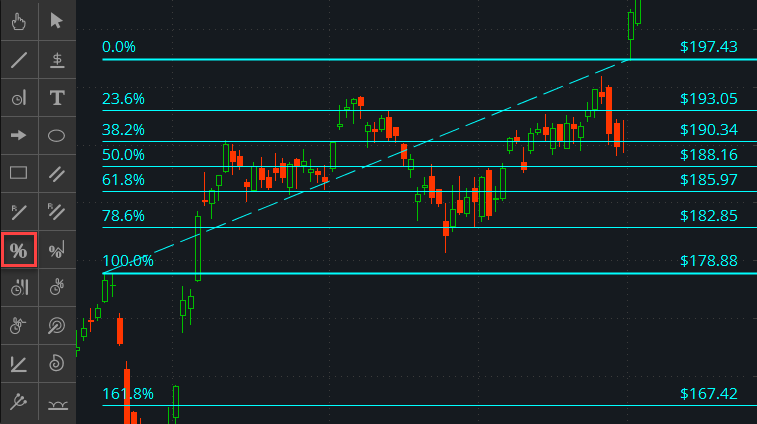For illustrative purposes only, not a recommendation.
Description
Fibonacci retracements are an important element of Elliott Wave Theory. Being a combination of a trendline with several horizontal levels (distant from each other based on Fibonacci ratios), they are said to be a powerful tool for determination of price objectives. If the trendline is defined correctly, the 38% and 62% retracement levels are the most important. In a strong trend, 38% level might serve as a minimum retracement mark while in a weaker trend, the 62% level can be considered a maximum retracement.
In order to add the Fibonacci retracements drawing to chart, choose it from the Active Tool menu. Specify begin and end points of the trendline; the retracement levels will be calculated automatically.
Properties
Appearance:
-
Visible. Set this property to "No" in order to hide the Fibonacci retracements.
-
Left extension. Set this property to "On" to extend the Fibonacci retracements all the way to the left. Note: this action will be only applied to the levels, not the trendline.
-
Right extension. Set this property to "On" to extend the Fibonacci retracements all the way to the right. Note: this action will be only applied to the levels, not the trendline.
-
Show coefficients. Defines where to display percentages corresponding to levels.
-
Show price. Defines where to display prices corresponding to levels.
Begin point:
-
Value. Defines the price value corresponding to the begin point of the trendline.
-
Date/Time. Defines the time scale value corresponding to the begin point of the trendline.
End Point:
-
Value. Defines the price value corresponding to the end point of the trendline.
-
Date/Time.Defines the time scale value corresponding to the end point of the trendline.
Fibonacci curve properties:
This section allows you to add extra parallel lines to the Fibonacci levels.
-
Visible. Defines which of the extra lines should be visible.
-
Coefficient. Defines the retracement percentage as a decimal.
-
Color. Defines the color of the line.
-
Style. Defines whether the line should be plotted as solid, long-dashed, or short-dashed.
-
Width. Defines the line width in pixels.
